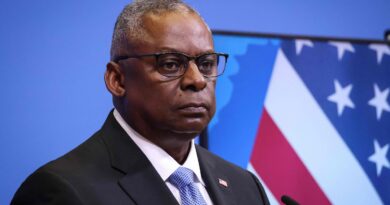Trump-like libertarian Javier Milei wins Argentina’s presidency
Trump also congratulated Milei. “I am very proud of you,” Trump wrote on his Truth Social platform. “You will turn your Country around and Make Argentina Great Again!”
Voters in this nation of 46 million demanded a drastic change from a government that has sent the peso tumbling, inflation skyrocketing and more than 40 percent of the population into poverty. With Milei, Argentina takes a leap into the unknown — with a leader promising to shatter the entire system.
Wielding chain saws on the campaign trail, the wild-haired Milei vowed to slash public spending in a country heavily dependent on government subsidies. He pledged to dollarize the economy, shut down the central bank and cut the number of government ministries from 18 to eight. His rallying campaign cry was a takedown of the country’s political “caste” — an Argentine version of Trump’s “drain the swamp.”
Massa was emblematic of that ruling elite — “the king of the caste,” political analyst Pablo Touzón said. The career politician attempted to distance himself from the leftist government of Alberto Fernández and Cristina Fernández de Kirchner, the heirs to the populist dynasty first launched by Juan and Eva “Evita” Perón in the 1940s. Along with a grass-roots campaign of activists, Massa sought to stoke fear over a Milei presidency they argued could threaten Argentina’s democracy and way of life.
But ultimately, anger won over fear. For many Argentines, the bigger risk was more of the same.
“We don’t have anything to lose,” Tomás Limodio, a 36-year-old business owner who voted for Milei in Buenos Aires on Sunday. “We’ve had this type of government for so many years, and things are only getting worse.”
Acknowledging his defeat Sunday night, Massa told supporters the results were “not what we had hoped for” and marked the end of a political chapter of his life. At the campaign headquarters, supporters consoled each other. A young woman burst into tears.
“There were two paths,” Massa said. “We chose the path of the defense of the security system in the hands of the state … the path of the defense of education and public health as central values. Argentines chose the other path.”
Milei’s landslide victory makes him the most-voted president in a runoff since the return of democracy in Argentina. The results suggest that many of those who said they would vote in blank, and did not feel represented by either candidate, ended up choosing Milei, said political analyst Mariel Fornoni.
“Evidently, people were not afraid to change,” she said.
A Milei presidency brings the far right to power in the third-largest economy in Latin America, and it could have profound implications for the region and the world. In a continent dominated by leftist leaders, Milei could create tensions with governments he has attacked, including crucial trading partner and neighbor Brazil. In an era of growing Chinese influence in Latin America, Milei could become the region’s most vocal antagonist to a country he once called “an assassin.”
Milei made a name for himself as a television pundit who insulted other guests, and he has shown a tendency to fight with the news media. He has circulated conspiracy theories and raised unsubstantiated claims about electoral fraud. In presidential debates, he has cast doubt on the widely accepted tally of murders during the country’s Dirty War from 1976 to 1983.
He has branded Pope Francis, an Argentine, an “evil” leftist. Climate change, he says, is a “socialist lie.” He would hold a referendum to undo the three-year-old law that legalized abortion.
Many Argentines chose to overlook the Milei messages that made them uncomfortable. For some, a vote for the outsider was a reluctant yet strategic one.
“The thinking is well, maybe since Milei is crazy, he’ll launch himself like a kamikaze” and make necessary reforms that previous leaders refused to make, in fear of getting kicked out of power, Touzón said. “Let’s use the crazy man to make the reforms that the rational ones didn’t want to make.”
For 16 of the past 20 years, Argentina has been governed by the powerful populist machine known as Peronism. The country’s leaders have left a once-wealthy nation — but often volatile economy — in its worst shape in two decades.
“We are living what we could call a second lost decade,” economist Matías Surt said.
For only the second time in its history, Argentina has seen 10 years without economic growth. During that decade, poverty rates shot up from 28 percent to more than 40 percent. Now, for the first time ever, even formal workers in Argentina’s economy are below the poverty line. Inflation is nearing 150 percent. The peso has plummeted, prices change nearly weekly, and Argentines are forced to carry around large wads of cash just to buy groceries.
With his viral TikTok videos and outlandish personality, Milei rallied a generation of young voters who have felt these frustrations for most of their lives. Today’s youngest voters only know an Argentina in economic decline. They have lived through the covid-19 pandemic, and they see the political left as the establishment, rather than the revolution it once was.
John Flores, 24, and his wife don’t know if they’ll ever be able to buy their own home. Flores, a nursing student, relies on his wife’s income and occasional odd jobs as a bricklayer or janitor to pay the rent and support an infant. Their money is worth less every day. Saving has become impossible.
“Massa wants to fix the problems that he himself created,” Flores said. “We’re tired, especially the young people.”
The question is whether Milei will be able to fulfill his mandate with strapped financial resources, no governing experience and few political allies in the legislature. Even compared with Trump and Jair Bolsonaro, the far-right former Brazilian president, “Argentina will have the most outsider of outsiders that has existed in recent years,” Touzón said.
Milei will take office as the “weakest” president in the 40 years since the country’s return to democracy, said Argentine political analyst Lucas Romero. This is not only because he lacks a majority in Congress, but also because he owes at least part of his triumph to a former president, Mauricio Macri, whose endorsement in the weeks before the vote gave Milei the political backing and credibility he previously lacked.
His triumph is expected to have a seismic effect on Argentina’s economy in the coming days. His proposals for dollarization have sent Argentines rushing to shed their pesos, causing the currency’s value to plunge.
“We are going to have a dark week,” said Damian Rodriguez, a 42-year-old salesman who held off on posting his most expensive kitchen appliances for sale online this week, waiting to see how prices would fluctuate after a possible Milei win.
Veronica Serminario, a 44-year-old public sector employee, worried that a Milei presidency would leave her country in ruins. In Milei, she said, she saw an “anti-democratic” candidate who negates the horrors of the military dictatorship and who wants to take away her rights and those of her children.
“Along with all of the other crazy ideas he has,” she said. “With that man, I don’t see a future for anyone.”
But for Jonathan Aguero, a 32-year-old, the future has looked bleak for quite some time now. The father of two who works in safety inspections has felt shortchanged by his country’s economic troubles for his entire life.
“I have three jobs, and it’s never enough,” he said, holding his six-month-old daughter after voting in a working-class neighborhood of Buenos Aires. “We’ve already seen what Peronism has done. We need a change.”




